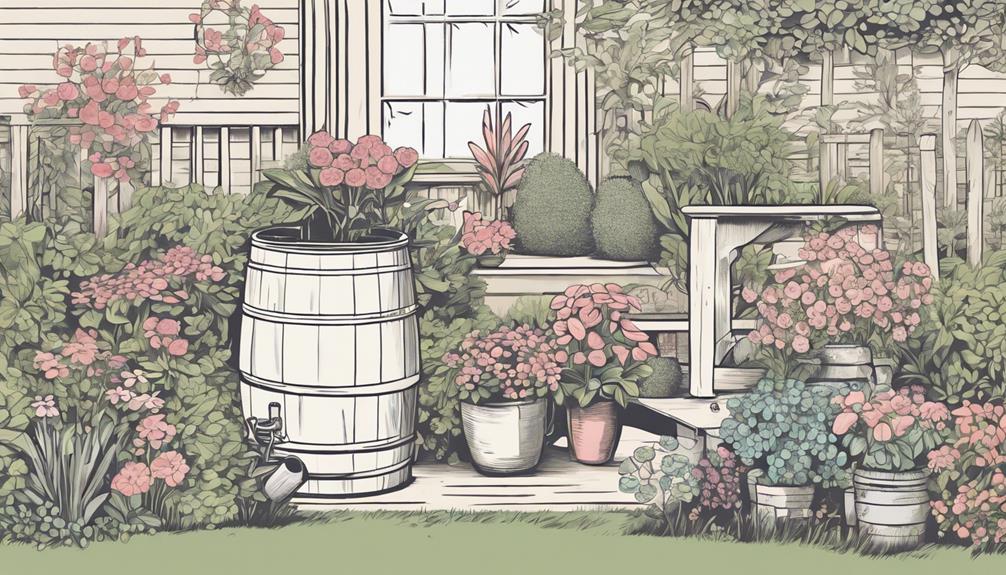See All: Backyard Farming
Free Backyard Farming Webinar…
You can grow food! This free webinar is for people who want the fastest and easiest ways to produce healthy and delicious vegetables, eggs, and meat. Because you know that growing your own food is like printing your own money…
Click Here To Watch The Free Webinar Now!
“I recently set up rain barrels in my backyard to collect rainwater for my garden. However, I’m concerned about maintaining the water quality over time. What steps should I take to ensure the water stays clean and safe for use in the garden?” Thanks, Michael, Portland, USA.
How Do I Maintain Water Quality In Rain Barrels?
Hi Michael! Having rain barrels can be an excellent way to conserve water and make your garden more sustainable. Taking care of them properly ensures you get the most benefit without risking the health of your plants. Let’s go through some key steps to maintain water quality in your rain barrels.
1. Selecting The Right Barrel
Choosing the right rain barrel is the first step in maintaining water quality. Ensure your barrel is made from food-grade materials to avoid any harmful chemicals leaching into the water. Plastic barrels are popular, but make sure they’re BPA-free and UV resistant.
2. Location And Setup
Where you place your rain barrel matters a lot. Here are a few tips:
- Shaded Areas: Place your rain barrel in a shaded area to prevent algae growth. Direct sunlight can encourage algae, making the water less suitable for garden use.
- Stable Surface: Ensure the barrel is on a level, stable surface to avoid tipping over.
- Elevate the Barrel: Elevating the barrel can help with water pressure when using a hose. You can use cinder blocks or a sturdy stand for this.
3. First Flush Systems
First flush systems help to divert the initial runoff, which may contain more contaminants like dust, bird droppings, and other debris from your roof. Installing a first flush device ensures cleaner water enters your barrel.
4. Use of Fine Mesh Screens
Installing fine mesh screens on the top of your rain barrel can prevent debris like leaves, twigs, and insects from getting inside. Regularly check and clean these screens to ensure they remain effective.
5. Regular Cleaning And Maintenance
To keep your water clean, periodically empty and clean your rain barrel. Here’s how:
- Drain the Barrel: Empty the water completely.
- Scrub the Interior: Use a brush and mild soap to scrub the inside. Avoid harsh chemicals as they can leave residues harmful to plants.
- Rinse Thoroughly: Rinse the barrel well to remove any soap residue.
6. Preventing Algae Growth
Algae can be a common issue in rain barrels, but you can prevent it with these steps:
- Keep It Dark: Algae needs sunlight to grow, so keeping the barrel in the shade and using opaque barrels can limit growth.
- Use Bleach: If algae are already present, you can add a small amount of bleach. The recommended amount is typically one-eighth teaspoon per gallon of water. Make sure to let it sit for at least 24 hours before using the water for plants.
7. Mosquito Control
Standing water can attract mosquitoes, but you can prevent this with a few measures:
- Mesh Screens: Ensure all openings are covered with fine mesh screens to keep mosquitoes out.
- Mosquito Dunks: Consider using mosquito dunks made from natural bacteria that kill mosquito larvae but are safe for plants and animals.
- Regular Draining: Use the collected water frequently to avoid long periods of standing water.
8. Winterizing Your Rain Barrels
If you live in a region with freezing temperatures, it’s important to winterize your rain barrels to prevent damage:
- Empty the Barrels: Completely drain the water before the first frost.
- Disconnect Barrels: Remove and store them in a sheltered area or turn them upside down to avoid freezing and cracking.
- Remove Accessories: Disconnect any hoses or accessories and store them properly.
9. Check for Leaks
Regularly inspect your rain barrels for leaks. Small cracks or holes can lead to water loss and contamination. Fix any leaks promptly with waterproof sealant suitable for your barrel material.
10. Safe Use of Rainwater
Remember that rainwater from barrels might not be suitable for all purposes. While it’s great for watering plants, avoid using it for drinking or cooking unless it’s been properly purified. Always use it for garden and landscape irrigation to stay on the safe side.
Final Thoughts…
Michael, maintaining water quality in your rain barrels involves a few key practices like choosing the right barrel, regular cleaning, controlling algae and mosquitoes, and winterizing. Following these steps will ensure you have a reliable source of water for your garden all year round. Thanks for reaching out and happy gardening!
Return To: Backyard Farming
Free Backyard Farming Webinar…
Marjory Wildcraft: For 20+ years, Marjory has been a leader in survival & preparedness and wants to show you how to grow food in your backyard farm. This free webinar is for people who want the fastest and easiest ways to produce healthy and delicious vegetables, eggs, and meat. Because you know that growing your own food is like printing your own money…

